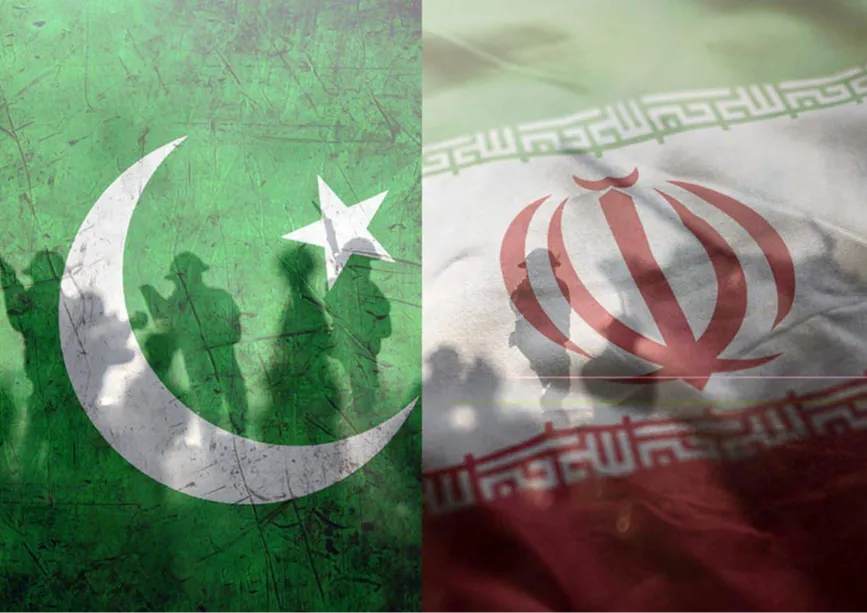
In the immediate aftermath of Iran’s missile and drone strikes on Pakistan’s Baluchistan province, Islamabad downgraded its diplomatic relationship with Tehran, recalling its ambassador and not allowing the Iranian ambassador to re-enter Pakistan. Islamabad also cancelled any impending high-level delegation visits and the Foreign Ministry spokesperson reiterated multiple times Pakistan’s right to respond to the ‘unprovoked’ and ‘illegal’ attacks. In the backdrop of the crisis in the Middle East, fears about Islamabad’s response, and its potential to further exacerbate the tensions were being debated. A military response or the lack of one, could affect Pakistan’s already faltering internal political and economic situation and the standing of the army in the context of the protests over the arrest of Imran Khan.
The strikes targeted seven locations where the Baluchistan Liberation Force and the Baluchistan Liberation Army were based, selected after an aerial survey.
Less than 48 hours after Iran first struck the country, the Joint Staff Headquarters of Pakistan’s armed forces launched ‘highly coordinated and specifically targeted precision military strikes’ against ‘terrorist hideouts’ in the Sistan Baluchestan province in south-western Iran. As per some reports, the attacks were approximately 80 km inside Iranian territory and hit Saravan city, killing nine people all of whom were foreign nationals. The strikes targeted seven locations where the Baluchistan Liberation Force and the Baluchistan Liberation Army were based, selected after an aerial survey. Deeming it an ‘intelligence-based operation’ with no mention of the strikes by Iran in the official statement, Islamabad highlighted Tehran’s intransigence when it came to addressing their concerns about the presence of Baluch terrorists in some ‘ungoverned spaces’ in the country. Its ‘preemptive strikes’ were intended to thwart possible large-scale terrorist attacks by the terrorists on their country.
The successful conduction of the strikes was taken to reflect the ‘professionalism’ of the armed forces. Already under pressure from the supporters of Imran Khan who is in jail, the army also needed to show its strength in response to the unprecedented attacks. While the retaliatory strikes may not quell the simmering discontent amongst the people for the army, the lack of a strong response may have compounded the internal difficulties further. As the country braces for a general election early next month, any further de-escalation in the security situation—with the Tehreek-e-Taliban-e-Pakistan (TTP) threat still looming large—may push the state further towards instability.
As tensions rose about the consequences of this escalation, Pakistan’s Foreign Ministry spokesperson stated that they did not want the situation to escalate and expected their adversaries to do the same. Iran called the Pakistan Charge d'affaires, demanding an ‘explanation’ about the attacks. While the Pakistani military is now on high alert, the timing of the crisis—both internally for Pakistan and externally—in terms of its already faltering relationship with Afghanistan and India has placed it in an unenviable position in the region. Responding to the development, India stated that it understands the actions that countries have to take in self-defense; a subtle reference to Iran’s legitimate concerns about the threat of terrorism emanating from Pakistan. While the initial strikes may not have been a spillover of the crisis in the Middle East and may have more to do with the long-existing differences across the border, how the situation unfolds in the future can influence that crisis.
The strikes targeted seven locations where the Baluchistan Liberation Force and the Baluchistan Liberation Army were based, selected after an aerial survey.
The initial strike by Iran also comes at an interesting time when it is indirectly embroiled in escalations across the Middle East. The war in Gaza has expanded fears of a region-wide escalation, which in part is already taking place as proxies aligned with Tehran such as the Houthis in Yemen have been targeting commercial shipping across the Red Sea. In response, the United States (US) has conducted airstrikes in Yemen targeting Houthi military assets such as missile launchers.
Iran’s actions against Pakistan, however, have little overlap with its strategic play across the Gulf. The border between Pakistan’s restive Baluchistan and Iran’s Sistan and Baluchestan province has been home to discontent and exchange of hostilities for years. The fact that this hyper-regional dynamic does not make mainstream debate often is because its nature is bilateral, and rarely crosses beyond its core geographic play. However, the escalation witnessed this week sets a new precedence, and a new low, for both Islamabad and Tehran.
As per some reports, China and Saudi Arabia have tried to mediate and de-escalate tensions. At the core of this crisis from an Iranian perspective is a group called Jaish ul-Adl, a Sunni-Salafi Baluch militant group largely operating around the two country’s borders with an aim towards more autonomy for Iran’s Sistan and Baluchestan province and rights for the Baluch people. Iranian strikes were targeted at Jaish’s camps across the border, and the group recognised that its bases were hit. A few hours after the hostilities began, Jaish claimed it assassinated a commander of Iran’s elite Islamic Revolutionary Guard Corps (IRGC), Colonel Hussein-Ali Javdanfar.
The border between Pakistan’s restive Baluchistan and Iran’s Sistan and Baluchestan province has been home to discontent and exchange of hostilities for years.
Both Iran and Pakistan have their hands full as far as regional conflicts are concerned. Neither would, ideally, want escalation beyond a point with both having their resources stretched thin economically and geopolitically. However, this event does bring another unwanted active theatre of conflict to the forefront of an international community that is already dealing with multiple flash points, and adding to the kitty of challenges within the first month of 2024.
Shivam Shekhawat is a Junior Fellow with the Strategic Studies Programme at the Observer Research Foundation
Kabir Taneja is a Fellow with the Strategic Studies Programme at the Observer Research Foundation
The views expressed above belong to the author(s). ORF research and analyses now available on Telegram! Click here to access our curated content — blogs, longforms and interviews.




 PREV
PREV



